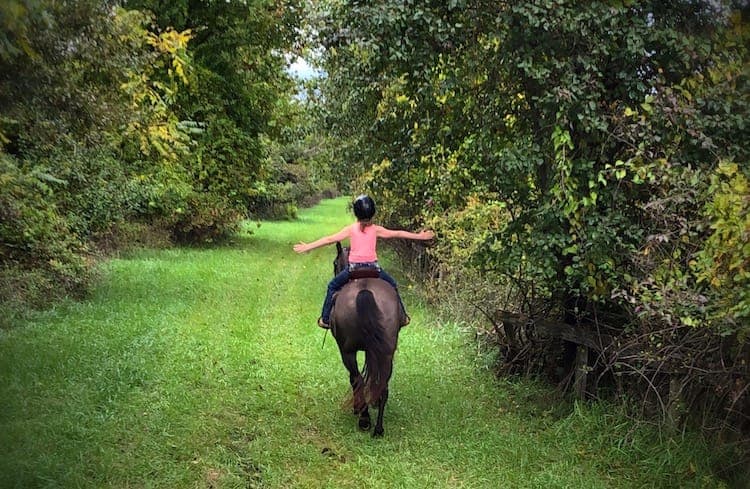Horse farms constitute over 25% of all agricultural land in Maryland, and 88,000 equine acres are preserved in perpetuity as farmland. MHC is committed to representing the horse industry’s interests in preserving as much land as possible for equine uses, to making sure those lands are taxed as agricultural uses no commercial uses, and to making sure that horse farms have the resources they need to operate in as sustainably and climate-friendly a way as possible.
In addition, most riders in Maryland are trail riders and most trail riders ride on public land. Recreational riding in Maryland supports ~5,000 jobs and adds $268 million in value to the state’s economy. The total economic impact of recreational riding is $438 million in 2022 dollars. MHC is committed to making sure the equestrian community continues to have access to existing Maryland public lands. MHC is also committed to increasing the amount of public land available for equestrian uses, to the extent practicable.

MHC’s Land Use and Natural Resources Accomplishments
- MHC works with Anne Arundel County to re-open Bacon Ridge Park to equestrians. (2022)
- MHC encourages member participation in the Sugarloaf Treasured Landscape Plan community and public meetings. (2022)
- MHC successfully pursues passage of a bill guaranteeing access to trail heads on state land for users and first responders. (2022)
- MHC testifies in favor of the Great Maryland Outdoors Act for increased funding for public land. (2022)
- MHC begins publishing monthly Farm Stewardship column in The Equiery. (2022)
- MHC submits written testimony to encourage Montgomery County to retain the Wheaton Park Stables and the Wheaton Regional Park equestrian trails in its Wheaton Regional Park Master Plan. (2021)
- MHC re-activates its Trails & Greenways Committee, now called the Trails Stewardship Committee. (2021)
- MHC works successfully to keep parks open for trail riding during the COVID-19 State of Emergency. (2020)
- MD horse farms certified by the Association of Soil Conservation District’s Farm Stewardship Assessment and Certification Program grows to 28 in large part due to the work of MHC’s Farm Stewardship Committee. (2016)
- MHC defeats a “county courtesy” bill, House Bill 203, which would have authorized hunting every Sunday during game mammal and game bird seasons in Caroline County. (2016)
- MD horse farms certified by the Association of Soil Conservation District’s Farm Stewardship Assessment and Certification Program grows to 17 in large part due to the work of MHC’s Farm Stewardship Committee. (2014)
- MHC Farm Stewardship Committee secures enrollment of 11 horse farms in the MD Association of Soil Conservation District’s Farm Stewardship and Conservation Assessment Program. (2013)
- The MHC Save the Horse Farms Committee, in partnership with the Law Offices of Kathleen JP Tabor, publishes a Zoning and Permitting Guide for horse farm owners. (2012)
- MHC launches its Farm Stewardship Committee. (2011)
- MHC launches the Save the Horse Farms Campaign, which has inspired several zoning-related victories in counties throughout the state. (2010)
- MHC sponsors “Horses as Agriculture” to codify that the definition of “livestock” includes horses, and that equine activities are agricultural. (2009)
- Successfully concludes effort to revise standards for apply the MALPF program to equestrian properties. (2008)
- MHC advises on changing nutrient management regulations to apply to properties with 8 or more horses only instead of properties with 4 or more horses. (2003)
Resources
County Zoning Laws for Horse Farms (2012)
Trail Etiquette and Safety (2022)
Sunday Hunting (2021)
